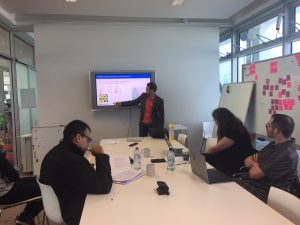Congratulations to Jürgen Brandstetter who successfully defended his PhD thesis today. It will become available in the library soon. Thanks to Clayton, Jen and Janette for the continues support for the project.
The Power of Robot Groups with a Focus on Persuasion and Linguistic Cues – Manipulating robot through the backdoor of language
Until now, the HRI community generated a lot of knowledge on how one robot affects one human. And on how one robot affects multiple human listeners. Much less knowledge is available on how robots affect the human language and how this language change can affect the human attitude and behavior. This language effect is of particular interest when we get to a situation where a major part of the human population has robots, like now smartphones. In this case, the questions are, what happens if all robots use the same words? For example, when they all use the same source as their dictionary. And will robots be able to affect the word choice of the human population? Even more interesting, will this word choice affect the attitude and behavior of the human population? To find out if this might be possible, I developed three with each other connected experiments.
In the first experiment, the effect of peer pressure on humans created by robots is explored. A particular focus was taken on, how this peer pressure affects the language of a person. To see if and how this influence of robots works, the effect of the robots was compared against humans-actors. The results of the experiment showed that the actors could indeed influence the participants as predicted. However, no such influence could be shown by the robots. It was concluded, that the reason why the robots did not affect the humans was, that the humans did not feel being part of the robots group.
In the second experiment, a group setting between the robot and the human was created. In this experiment, the robot tried to influence the human language. Important here to mention is, that the experiment measures if the language of the participant was affected by the robots influence, even after the interaction and without any robot in the room. Furthermore, it was also measured if the word chosen by the robot had an influence on how a person would perceive the discussed object. The outcome of the experiment was successfully, and it showed that first, the group building worked and that now the robot was able to affect the human language. Second, that robots are able to effect the human language even after the interaction was over. And third, that robots are able to affect the humans’ attitude toward objects simply by using positive or negative connoted synonyms for the particular object.
In the third and last experiment, the question was, can many robots affect the language of a whole human population. A couple of different parameters were measured. Which were; how many humans need robots so that the robots could manipulate the whole human population’s language. And, does it matter what person in the human population will get a robot. Is it a person who is very well connected or a person who is poorly connected? Since, we are currently not in a time where a huge amount of people actually have robots, and we would not be able to influence all of this robots, a simulation was created. Within this simulation, the before described parameters were simulated. The outcome was, that on average only 11\% of the human population need robots so that the robots might affect the language of 95\% of the human population.
Finally, to further deepen the knowledge on how simple language change can affect the human’s attitude and behavior a literature review is added. This review focuses particularly on persuasion via language, which includes effects like gender neutral versus non-gender neutral language. To conclude, this dissertation shows, that in certain situations a group of robots is able to effect the language of the biggest part of the human population. Which in turn might lead to a change in behavior in the same population.

